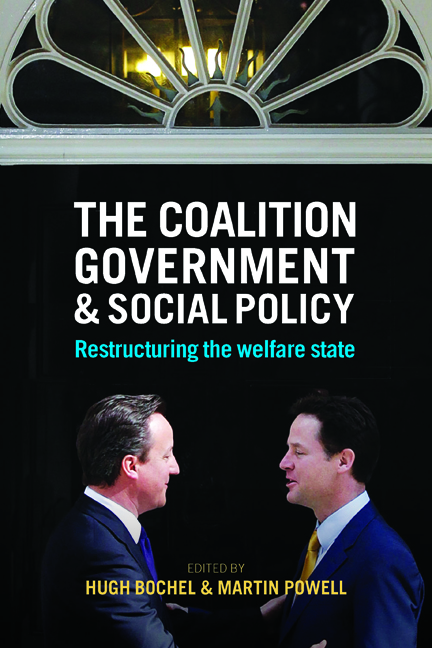Book contents
- Frontmatter
- Contents
- Notes on contributors
- One The transformation of the welfare state? The Conservative–Liberal Democrat coalition government and social policy
- Two The coalition government, public spending and social policy
- Three The changing governance of social policy
- Four The coalition, social policy and public opinion
- Five Health policy and the coalition government
- Six The coalition government, the general election and the policy ratchet in education: a reflection on the ‘ghosts’ of policy past, present and yet to come
- Seven Coalition housing policy in England
- Eight Social security under the coalition and Conservatives: shredding the system for people of working age; privileging pensioners
- Nine Welfare and active labour market policies in the UK: the coalition government approach
- Ten ‘It ain’t what you do, it’s the way that you do it’: adult social care under the coalition
- Eleven Family policy: the Mods and Rockers
- Twelve One step forward, two steps back: children, young people and the Conservative–Liberal Democrat coalition
- Thirteen The coalition and criminal justice
- Fourteen Equalities: the impact of welfare reform and austerity by gender, disability and age
- Fifteen Social policy, the devolved administrations and the UK coalition government
- Sixteen Conclusions
- Index
Sixteen - Conclusions
Published online by Cambridge University Press: 01 September 2022
- Frontmatter
- Contents
- Notes on contributors
- One The transformation of the welfare state? The Conservative–Liberal Democrat coalition government and social policy
- Two The coalition government, public spending and social policy
- Three The changing governance of social policy
- Four The coalition, social policy and public opinion
- Five Health policy and the coalition government
- Six The coalition government, the general election and the policy ratchet in education: a reflection on the ‘ghosts’ of policy past, present and yet to come
- Seven Coalition housing policy in England
- Eight Social security under the coalition and Conservatives: shredding the system for people of working age; privileging pensioners
- Nine Welfare and active labour market policies in the UK: the coalition government approach
- Ten ‘It ain’t what you do, it’s the way that you do it’: adult social care under the coalition
- Eleven Family policy: the Mods and Rockers
- Twelve One step forward, two steps back: children, young people and the Conservative–Liberal Democrat coalition
- Thirteen The coalition and criminal justice
- Fourteen Equalities: the impact of welfare reform and austerity by gender, disability and age
- Fifteen Social policy, the devolved administrations and the UK coalition government
- Sixteen Conclusions
- Index
Summary
Introduction
This chapter aims to place the main points identified by the contributors into the framework introduced in Chapter One. In particular, it revisits the questions of the main approaches underlying the coalition government, whether its social policies may best be seen as ‘One Nation’ Conservative, New Right or Third Way, and to what extent it reflected Conservative or Liberal Democrat influences. It also explores the first 100 days of the Conservative government elected in May 2015, focusing on the first Conservative Queen's Speech since 1996, the Budget of July 2015 and 100-day audits of a number of commentators.
Which way for the coalition government?
This section draws upon Powell's (1999) discussion of New Labour and the Third Way to examine changes to the provision of welfare under the coalition by setting them against the framework of alternative political approaches. It can be seen from Table 16.1 that our initial assessment set out in Table 1.1 is largely in line with the views of the contributors, suggesting that, in most respects, the coalition government can be seen as having significant similarities with the New Right.
Approach
There appears to be little use of the investor/deregulator language, but the policies of the coalition government appear to have been significantly closer to the ‘deregulator’ approach of the New Right than to the ‘investor’ approach of the Third Way. There was clearly some shared discourse with elements of the Third Way, such as in relation to transforming the welfare state from a safety net in times of trouble to a springboard for economic opportunity, the emphasis on ‘welfare’ offering a hand up rather than a handout, the centrality of paid work as the route out of poverty, and the emphasis on individual agency and choice. Both Labour and coalition governments remained committed to the National Minimum Wage, and also to the provision of highquality affordable childcare. However, while both New Labour and coalition governments sought to ‘make work pay’, and to use a mix of carrots and sticks, for the coalition, reducing benefits and raising the income tax threshold were important tools, in contrast to the widespread use of tax credits under Labour, while the development and gradual introduction of Universal Credit was intended not only to reduce the complexity of the system, but also to increase conditionality (Chapters Eight and Nine).
- Type
- Chapter
- Information
- The Coalition Government and Social PolicyRestructuring the Welfare State, pp. 347 - 370Publisher: Bristol University PressPrint publication year: 2016



